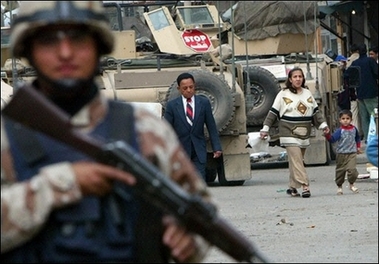General: No military solution for Iraq
(AFP)Updated: 2007-03-08 22:22
Braving the sectarian terror, thousands of Shiite pilgrims were streaming to Karbala to join about 2.5 million devotees already in the holy city for the sombre religious ceremony of Arbaeen on Friday.
At his first news conference since taking charge of US-led forces in Iraq, Petraeus said he felt "shame, horror and sorrow" when he heard of a suicide attack on Tuesday that killed at least 117 Shiite pilgrims .
He said "thugs with no souls" were carrying out atrocities to derail Operation Fardh al-Qanoon (Imposing Law), launched with 90,000 Iraqi and US troops last month in a bid to quell sectarian violence in Baghdad.
The US military is implementing a "surge" of more than 21,500 extra troops into Baghdad and neighbouring Anbar province in support of the plan.
But the general cautioned against expecting too much from the military and warned the security plan would take months to complete.
"There is no military solution to a problem like that in Iraq," the general told massed ranks of reporters in Baghdad's fortified Green Zone. "Military action is necessary to help improve security... but it is not sufficient."
Political talks involving all groups, including militants opposed to Prime Minister Nuri al-Maliki's government "will determine in the long run the success of this effort," he said.
Petraeus said one of five additional army brigades was already in place, another was partially deployed and the rest -- along with two extra battalions of marines -- would be in country by June.
Asked about reports that his second in command, General Raymond Odiernom, believed that the extra troops would be needed until early 2008, Petraeus said the timeframe had yet to be decided.
"I think you generally think that if you're going to achieve the kind of effects that we probably need, I would think it would need to be sustained certainly some time well beyond the summer," he said.
US troops, he said, will work with Iraqi colleagues to enable "the Iraqi people to control the demons responsible for the vicious sectarian violence of the past year -- demons that tore at the very fabric of Iraqi society."
"Indeed, our operations will endeavour to provide Iraq's citizens and leaders with the chance to mend that fabric."
Petraeus took command of US-led forces on February 10 after US President George W. Bush admitted two operations launched last year to pacify Baghdad had failed because of a lack of troops to hold cleared areas.
He must now oversee a strategy to contain faction fighting between Iraq's Sunni and Shiite factions and thus give Prime Minister Maliki's Iraqi government time to pursuse a programme of national reconciliation.
His task will not be easy, with many Iraqis opposed to the US military presence in their country.
Radical Shiite cleric Moqtada al-Sadr, whose whereabouts remain a mystery three weeks after US commanders said he had fled to Iran, renewed his demand on Thursday that US forces should leave.
In a message distributed by his office in Najaf to mark the Arbaeen holiday, Sadr told his countrymen: "Raise your voices shouting 'No, no to America. No, no to Israel'."
With Karbala flooded with pilgrims, Iraqi security forces were taking no chances and the town's governor Aqil Al-Khazali said tight security was in place, including modern equipment to detect explosive vests.
Outside the city, however, attacks continued, albeit without the savagery of recent days: six Shiite pilgrims were wounded in separate bomb and gun attacks in towns south of Baghdad as they walked towards Karbala, police said.
Security officials said six people were killed in other parts of the country on Thursday, including two policemen who died when a car bomb exploded in the northern city of Mosul.
|
||
|
||
|
|


